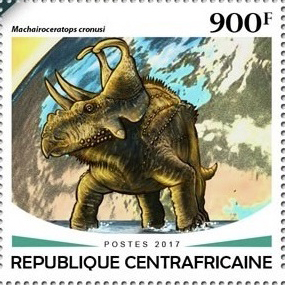Machairoceratops cronusi Lund et al., 2016

(Da: it.wikipedia.org)
Phylum: Chordata Haeckel, 1874
Subphylum: Vertebrata Cuvier, 1812
Classe: Dinosauria Owen, 1841
Ordine: Ornithischia Seeley, 1888
Famiglia: Ceratopsidae Marsh, 1890
Genere: Machairoceratops Lund et al., 2016
Descrizione
Il genere Machairoceratops contiene una singola specie, M. cronusi, descritta e nominata nel 2016 da Eric K. Lund, Patrick M. O'Connor, Mark A. Loewen e Zubair A. Jinnah. Il nome generico, Machairoceratops, deriva dal greco antico machairis, che significa spada piegata, in riferimento all'orientamento unico del collare osseo dell'animale e alle due lunghe corna piegate in avanti poste sulla parte più alta del collare, unito alla parola greca ceratops, che significa faccia cornuta, che è un suffisso comune per i nomi dei generi dei ceratopsidi. Il nome specifico, cronusi, invece si riferisce a Crono, un dio greco che depose il padre Urano, da lui castrato con un falcetto o con una falce sulla base della mitologia greca, e come tale il dio Crono è sempre mostrato con un'arma da taglio curva, così come le corna ornamentali piegate quasi ad angolo poste sulla parte più alta del collare osseo dell'animale. Il Machairoceratops è conosciuta solo dal suo olotipo, UMNH VP 20550, ritrovato già nel 2006, oggi conservato presso il Museo di Storia Naturale dello Utah. L'olotipo è composto da un cranio parziale, che comprende due corna sopraorbitali curve e allungate, l'osso giugale, una scatola cranica quasi completa ma leggermente deformata, l'osso squamoso e un osso parietale, più un unico corno ornamentale ricurvo posto sulla parte più alta del collare.
Diffusione
È un genere estinto di dinosauro ceratopside centrosaurino vissuto nel Cretaceo superiore, circa 80.1-77 milioni di anni fa (Campaniano), in quella che oggi è la Formazione Wahweap, nel Grand Staircase-Escalante National Monument, nel sud dello Utah, Stati Uniti.
Bibliografia
–Eric K. Lund; Patrick M. O’Connor; Mark A. Loewen; Zubair A. Jinnah (2016). "A New Centrosaurine Ceratopsid, Machairoceratops cronusi gen et sp. nov., from the Upper Sand Member of the Wahweap Formation (Middle Campanian), Southern Utah". PLOS ONE. 11 (5): e0154403.
–Loewen, Mark A.; Sertich, Joseph J. W.; Sampson, Scott; O’Connor, Jingmai K.; Carpenter, Savhannah; Sisson, Brock; Øhlenschlæger, Anna; Farke, Andrew A.; Makovicky, Peter J.; Longrich, Nick; Evans, David C. (20 June 2024). "Lokiceratops rangiformis gen. et sp. nov. (Ceratopsidae: Centrosaurinae) from the Campanian Judith River Formation of Montana reveals rapid regional radiations and extreme endemism within centrosaurine dinosaurs". PeerJ. 12: e17224.
–Beveridge, Tegan L.; Roberts, Eric M.; Ramezani, Jahandar; Titus, Alan L.; Eaton, Jeffrey G.; Irmis, Randall B.; Sertich, Joseph J.W. (April 2022). "Refined geochronology and revised stratigraphic nomenclature of the Upper Cretaceous Wahweap Formation, Utah, U.S.A. and the age of early Campanian vertebrates from southern Laramidia". Palaeogeography, Palaeoclimatology, Palaeoecology. 591: 110876.
–Zubair A. Jinnah, #30088 (2009)Sequence Stratigraphic Control from Alluvial Architecture of Upper Cretaceous Fluvial System - Wahweap Formation, Southern Utah, U.S.A. Search and Discovery Article #30088. Posted June 16, 2009.
–Gates, T. A.; Horner, J. R.; Hanna, R. R.; Nelson, C. R. (2011). "New unadorned hadrosaurine hadrosaurid (Dinosauria, Ornithopoda) from the Campanian of North America". Journal of Vertebrate Paleontology. 31 (4): 798.
–Kirkland, James I.; DeBlieux, Donald D. (September 2007). "New Horned Dinosaurs from the Wahweap Formation" (PDF). Utah Geological Survey.
–Kirkland, J.I.; DeBlieux, D.D. (2010). "New basal centrosaurine ceratopsian skulls from the Wahweap Formation (Middle Campanian), Grand Staircase–Escalante National Monument, southern Utah". In Ryan, M.J.; Chinnery-Allgeier, B.J.; Eberth, D.A. (eds.). New Perspectives on Horned Dinosaurs: The Royal Tyrrell Museum Ceratopsian Symposium. Bloomington: Indiana University Press. pp. 117-140.
–Terry A. Gates; Zubair Jinnah; Carolyn Levitt; Michael A. Getty (2014). "New hadrosaurid (Dinosauria, Ornithopoda) specimens from the lower-middle Campanian Wahweap Formation of southern Utah". In David A. Eberth; David C. Evans (eds.). Hadrosaurs: Proceedings of the International Hadrosaur Symposium. Indiana University Press. pp. 156-173.
–John Wesley Powell Memorial Museum display.
–"Diabloceratops eatoni". Natural History Museum of Utah. May 14, 2012.
–Thompson, Cameron R. "A preliminary report on biostratigraphy of Cretaceous freshwater rays, Wahweap Formation and John Henry Member of the Straight Cliffs Formation, southern Utah." Abstracts with Programs - Geological Society of America, vol.36, no.4, pp.91, Apr 2004.
–Orsulak, Megan et al. "A lungfish burrow in late Cretaceous upper capping sandstone member of the Wahweap Formation Cockscomb area, Grand Staircase-Escalante National Monument, Utah." Abstracts with Programs - Geological Society of America, vol. 39, no. 5, pp.43, May 2007.
–Eaton, Jeffrey G; Cifelli, Richard L. "Review of Cretaceous mammalian paleontology; Grand Staircase-Escalante National Monument, Utah. Abstracts with Programs - Geological Society of America, vol.37, no.7, pp.115, Oct 2005.
–Tester, Edward et al. Isolated vertebrate tracks from the Upper Cretaceous capping sandstone member of the Wahweap Formation; Grand Staircase-Escalante National Monument, UtahAbstracts with Programs - Geological Society of America, vol. 39, no. 5, pp.42, May 2007.
–Simpson, Edward L.; Hilbert-Wolf, Hannah L.; Wizevich, Michael C.; Tindall, Sarah E.; Fasinski, Ben R.; Storm, Lauren P.; Needle, Mattathias D. (2010). "Predatory digging behavior by dinosaurs". Geology. 38 (8): 699-702.
–De Blieux, Donald D. "Analysis of Jim's hadrosaur site; a dinosaur site in the middle Campanian (Cretaceous) Wahweap Formation of Grand Staircase-Escalante National Monument (GSENM), southern Utah." Abstracts with Programs - Geological Society of America, vol. 39, no. 5, pp. 6, May 2007.
–Kirkland, James Ian. "An inventory of paleontological resources in the lower Wahweap Formation (lower Campanian), southern Kaiparowits Plateau, Grand Staircase-Escalante National Monument, Utah." Abstracts with Programs - Geological Society of America, vol.37, no.7, pp.114, Oct 2005.
–Williams, Jessica A J; Lohrengel, C Frederick. Preliminary study of freshwater gastropods in the Wahweap Formation, Bryce Canyon National Park, Utah. Abstracts with Programs - Geological Society of America, vol. 39, no. 5, pp.43, May 2007.

|
Data: 23/10/2017
Emissione: I dinosauri Stato: Central African Republic Nota: Emesso in un foglietto di 4 v. diversi |
|---|